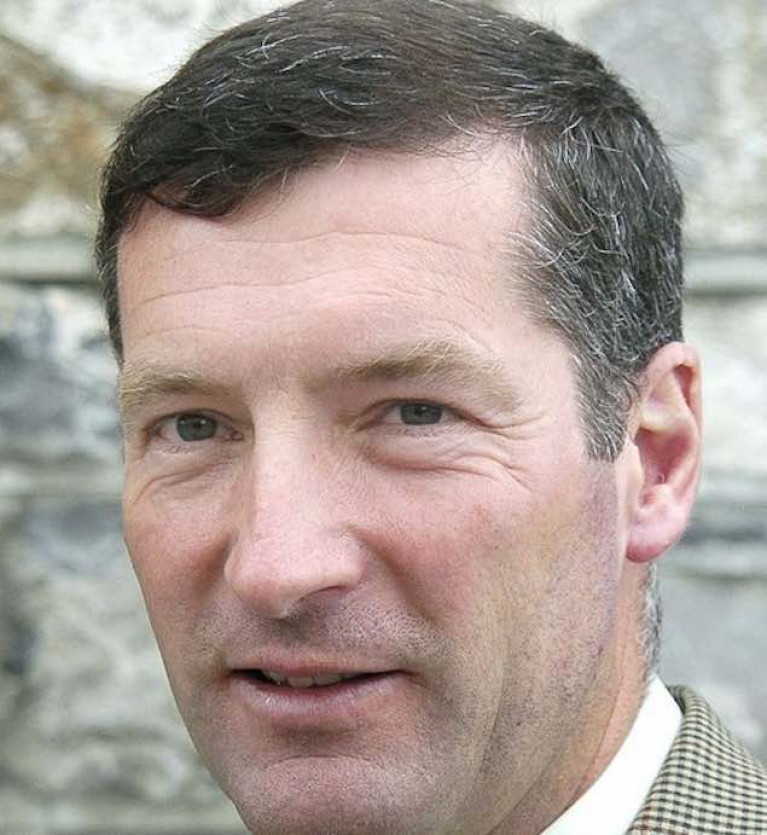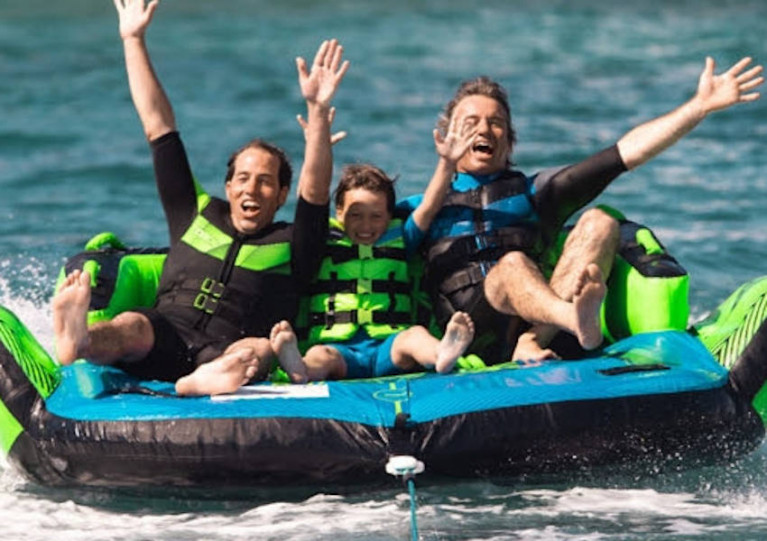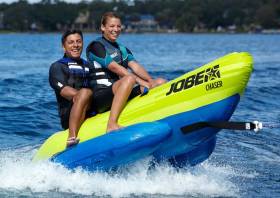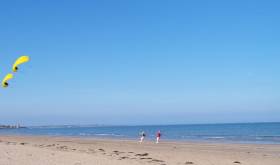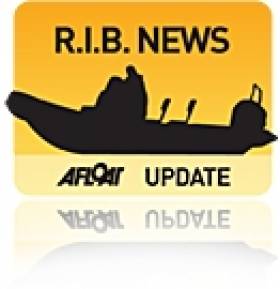Displaying items by tag: inflatables
Sailing Will Help Deal With the 'Inflatables' Problem
Five local Councils, in cities and counties around the country, are now considering banning what has been termed as the "killer inflatable toys" from local beaches.
This follows the call by the Chief Executive of Water Safety Ireland on Afloat.ie last week for such a ban
John Leech said that, after almost a dozen rescues by the RNLI, Coast Guard, fishermen and members of the public during this Summer, action to protect life had to be taken against "these very dangerous toys." There was a huge response to his Podcast.
This week he told me that sailing was going to help in a campaign to increase safety, particularly for Paddle Board. Amongst the support he has received has been from UK Sailmakers Ireland, formerly known as McWilliam Sailmakers, at Crosshaven in Co. Cork, with an initiative to install warning windsocks on beaches, which Mr Leech outlines in his week's Podcast.
"Sailing has shown how the use of lifejackets and buoyancy aids can be easily and assimilated into enjoying watersports"
A sailor himself and an international racing judge, the CEO of the national water safety organisation says safety level in watersports is at a high level and sailing has shown how the use of lifejackets and buoyancy aids can be easily and assimilated into enjoying watersports.
What is of most concern, he says in this week's Podcast is those to who are inconsiderate of others, such as the demands they make on the rescue services and irresponsible in using the "dangerous inflatables" which have also been the source of criticism from the RNLI and warnings from the Coast Guard.
"They are not suitable in Irish waters," he said. To get this message home, a new educational programme is to be introduced through the schools, as well as the initiative from UK Sailmakers.
The current period of lifeguards patrolling beaches ends on September 15.
"We do not want more dangerous incidents before then," says the Water Safety Ireland CEO. "The response through Afloat has been very impressive and shows strong public support for what we are trying to achieve – safety on the water and the safe enjoyment of being on the water."
Listen to the Podcast here
With the weather looking up from this weekend, there’s no better time to get out and have fun on the water with a Jobe towables from CH Marine.
The range includes inflatable chairs like the two-seater Anura, now only €239 — and watersleds like the one-person Sunray, now only €165.
Options for one, two, three and four or more persons are available but are selling fast, and only available while stocks last.
Serious Deals On Serious Fun Jobe Inflatables From CH Marine
Jobe towable inflatables mean serious fun on the water — and with discounts across the range from CH Marine this August, you can make some serious savings, too.
Inflatable rings, chairs and watersleds suitable for anywhere from one to eight people are 15% off this month — with an extra special deal on the Jobe Dolphi trainer towable, knocked down from €164.95 to just €99.99.
For those who prefer a more sedate experience afloat, you might be interested in a single kayak or double kayaks package from Titan Layaran.
And be sure to check out CH Marine’s other August offers, which include a free lifejacket with Plastimo Activ’ offshore sailing jacket and hi-fit trousers combos.
A member of the US Coast Guard and three of his relatives have been praised by the father of a young girl rescued after she was swept out to sea from a Dublin beach.
As The Irish Times reports, Walter Butler and his relations Eoghan Butler, Declan Butler and Alex Thomson leapt into action when they heard screams for help and saw the girl on a “pink floaty” off Portmarnock beach on Monday afternoon (22 July).
Butler remained on the beach ready to provide casualty care while the others swam out to the girl, who was swept some distance from shore and at one point was struggling to stay afloat after coming off her inflatable.
“We have all been swimming competitively since we were six or seven years old so to say we are good swimmers is an understatement,” said Butler — who noted that it still took half an hour for his relatives to reach the girl and swim her back to the beach, where paramedics and her relieved father were waiting.
The dangers of using inflatables at the seaside were highlighted again just hours later, when Larne RNLI launched yesterday afternoon (Tuesday 23 July) to a report of three people being carried out to sea on inflatable toys in Browns Bay.
At the scene, the volunteer crew found a small fishing vessel had already taken one casualty on board, and they look over to bring the remaining two onto the lifeboat.
RNLI volunteer helm Barry Kirkpatrick said: “We advise you not to use inflatables at the beach as offshore winds can easily sweep you off the shore in a very quick space of time.
“If you do get into difficulty or see anyone else in difficulty, please remember to call 999 or 112 and ask for the coastguard.”
Belfast Coastguard has warned that a number of children have been blown out to sea on inflatable toys in recent days.
“Please remember the safest place for children to play with these death traps is in the back garden,” a spokesperson said.
The Avon SeaRider Becomes the Zodiac SeaRider
One of the best known RIB makes in the world, the Avon Searider, with hundreds in service with schools, clubs and commercial organisations around Ireland, and literally tens of thousands with similar organisations all over the world, has been treated to an upgrade and will now be sold as the Zodiac SeaRider.
Avon has been owned by Zodiac for many years now, but up until now, the two ranges were sold under separate brand names, and through separate distribution networks.
As part of a wider product integration programme, both ranges will now be sold exclusively through the Zodiac network, and under the Zodiac brand name.
This programme has already seen upgrades to the specification of the Zodiac Grand Raid range of inflatables, long established as the benchmark for commercial inflatable boats, as well as to the Avon W range of WorkBoats, now known as the Zodiac WB range of WorkBoats. These upgrades include even heavier Hypalon fabric, heavier duty standard equipment, new features fitted as standard, and a wider range of heavy duty consoles and seating.
The SeaRider range will continue to be built in the Avon factory in Llanelli, in Wales, as will the new WB series of WorkBoats, ERB Rescue Boats etc. They still offer the same outstanding performance, feature the same materials, and same "bulletproof" construction. The flooding bilge design provides ballast to make the SeaRider a stable platform while stationary at sea.

This feature is a hallmark of the SeaRider range, and is indespensible to divers, port authorities, military and race managers alike. The photo above shows a prototype SeaRider 5.4m in mid air, with old style Avon fendering. The first models in the New Zodiac SeaRider livery are due in Ireland within the next 14 days, and they look really well with the dark grey hull and deck, grey tubes and extra wide heavy duty black fendering.
Zodiac SeaRiders will also be available to special order in the old Avon colour scheme of Grey tubes with Orange Hull and deck - this will involve a slightly longer lead time, but gives fleet owners the possibility of adding new boats to their fleet in the same colour scheme as existing boats. The new Zodiac MilPro catalogue, incorporating models from both Zodiac and Avon ranges will be available shortly. However, we wanted to bring this news to you as soon as possible and we will contact you again with more information in the near future.
The sole importer for Zodiac in Ireland is Western Marine in Dalkey, Co. Dublin.



























